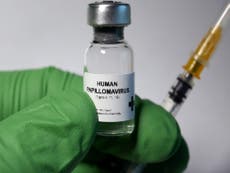No, it's not ‘fat-shaming’ to state the facts about obesity and cancer – the science speaks its own truth
To talk about people ‘in larger bodies’ as if they are wearing them like a piece of clothing is a bizarre perversion of language that hints at a diminishing of personal responsibility

The largest organisation in Europe conducting research into cancer has thrust some new and valuable information under our noses, and crashed into a row about so-called fat-shaming.
Cancer Research UK’s latest ad campaign reminds us that obesity is a very significant risk factor for the development of the disease, and reveals that some cancers – including liver and ovarian, both of which still have very poor mortality rates – are actually more likely to be caused by obesity than by puffing away on a cigarette.
Interesting. And, on a whole population basis at least, very significant too. For while only 14 per cent of adults in Britain were smokers last year, 26 per cent of British adults are classed as obese, according to Public Health England and the Office for National Statistics.
This is an important leap in our understanding of how and why cancer develops. Yet the charity’s efforts to communicate that information have left it tangled in the argument about how we discuss our bodies and our lifestyles.
The organisation launched an advertising campaign which depicts the word “obesity” on the front of a mocked-up cigarette packet, to highlight how carrying excess weight can be as risky as smoking in the potential development of cancerous cells. Yes, it is a bold image, but in a hyper-distracted world, how else to attract our attention?
It certainly did that, but the backlash that followed – particularly on social media – has been unrelenting. “Fat-shaming just makes people feel worse and responsible for their cancer,” said one critic. “Correlation is not causation.”
Many were angered by the idea that obesity is a lifestyle choice akin to smoking.
And they’re right. It is not. But, then, is smoking really a choice either?
We know that cigarette smoking is linked to other social issues such as poverty, educational attainment and life chances. Just like obesity. For those with a true nicotine addiction, which accounts for most regular cigarette smokers, beating the habit is a very difficult, very complex process with immediate and measurable health improvements. Again, the same is true for weight loss.
For some, eating patterns are also a matter of addiction. For most of us it’s less serious than that, but habit reversal is a significant psychological process.
There is a danger in the way we talk about food and bodies. Unlike nicotine or tar, our bodies need food to thrive – including the fats and carbohydrates that have been the target of diet fads immemorial. Our bodies are naturally variant; our shapes and sizes mean that a healthy lifestyle and a healthy body for one individual will absolutely not physically look the same as another.
So, yes, it is important that this information about cancer and its roots is displayed in a way that is also sensitive to our perverse culture of body fetishism, in which smaller and larger bodies are both criticised, while something known as the “dad bod” – a middle-aged male torso sporting a beer gut – has somehow become a fashion accessory.
Society dismisses the needs of larger and smaller bodies constantly, not just in terms of weight but also height. I am 5ft tall; public transport is absolutely not designed for me any more than it is designed for someone of a larger body mass index. Every single train trip results in a cricked neck as my head is thrust forward by headrests designed for the average person at least 6in taller.
But sensitivity to such things should not include burying public information because it might upset someone who is obese. Nor should Cancer Research UK have to issue apologies for being bold in their campaigning techniques. Their aims are laudable, and if they have to shock us to achieve those aims then so be it.
It is also far too simplistic to say that “shaming”, as it has become known, never has a positive side effect. Once the evidence linking cigarette smoke to neonatal deaths and child illness was established, smoking near children became a shameful activity, with straightforward benefits. It’s interesting, then, that the generation that benefited from such a substantial behaviour change in the late 1980s and 1990s is now demonstrating much less risky behaviour around substance consumption including nicotine and alcohol.
So why can’t the same process happen again today with excess calorie intake and physical movement? The introduction of the “sugar tax”, now under threat as Boris Johnson campaigns to become the next prime minister, was roundly accepted by society and had its intended result: fewer sugary drinks are now sold and consumed.
There may be other interventions we can make on a population-wide basis, but just like the campaign to stop smoking, so much about altering personal behaviours has to do with the social pressures that surround us. Concern over being seen to “fat shame” means that this pressure is being dissipated, and that too is unhealthy.
To talk, as some commentators have, about people “in larger bodies” as if they are wearing them like a piece of clothing, rather than living through them, is a bizarre perversion of language that hints at a diminishing of personal responsibility. That’s not a healthy development either.
It is not fat-shaming to share basic scientific information about the correlation between obesity and cancer, as Cancer Research UK has done with its fag packet campaign this week. On Twitter, it responded to one complainant with the remark: “This campaign is not meant to upset anyone or make anyone feel bad about their weight. We’re sorry that you’ve been upset.”
However, this social media storm cannot have taken the charity by surprise. Earlier this year a similar campaign prompted the same outcry. Comedian Sofie Hagan called the charity’s advertising materials on cancer and obesity “incredibly damaging” and alleged that society’s attitudes towards obesity kill more larger people than cancer. I’m not sure there’s any peer-reviewed evidence for that, but it makes one thing certain: Cancer Research UK has got us all talking about the link between cancer and obesity yet again – and it would be no surprise if it knew exactly what it was doing.







Join our commenting forum
Join thought-provoking conversations, follow other Independent readers and see their replies